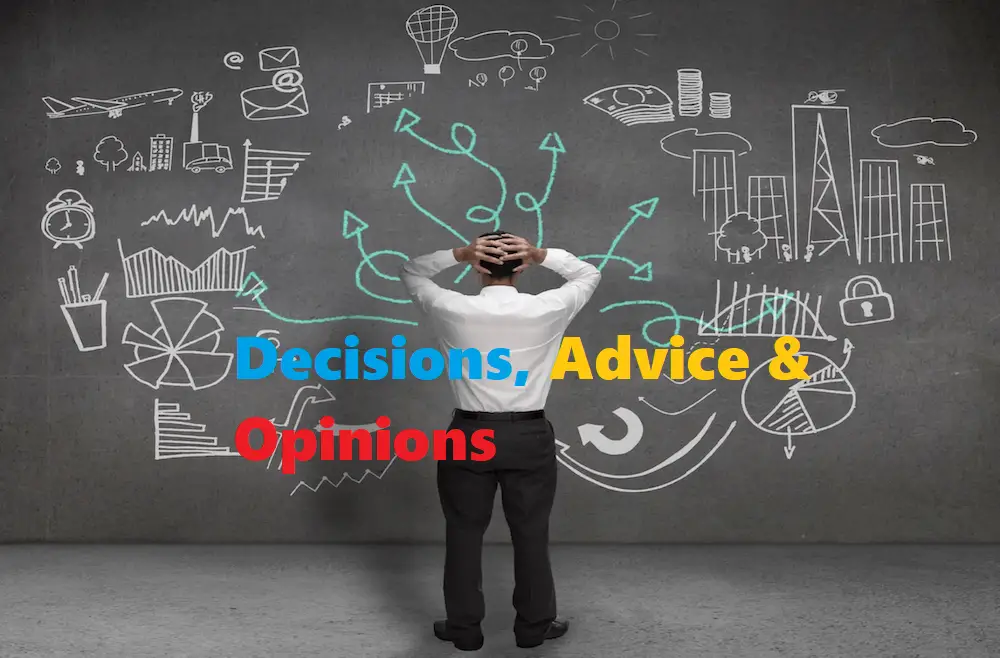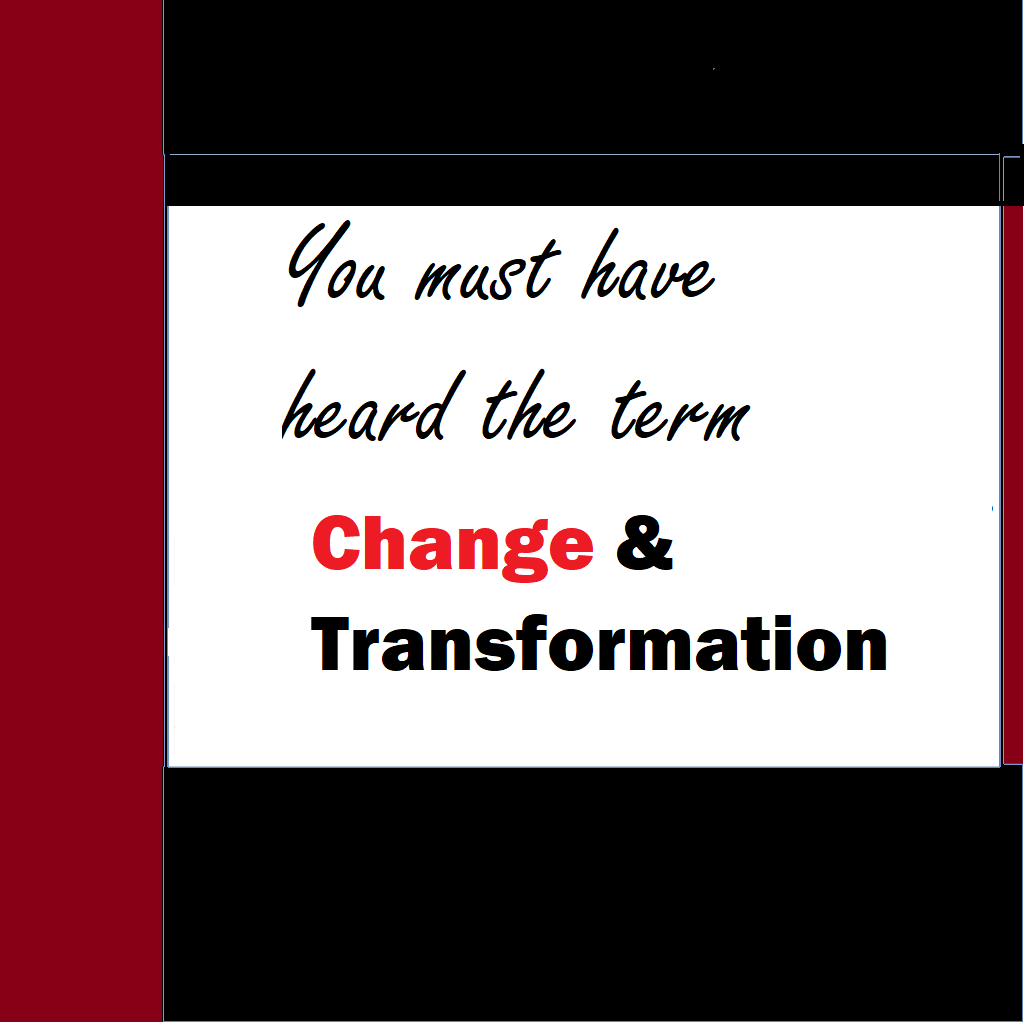What is a decision?
A decision is a cognitive process involving the selection of a course of action or belief from various alternatives. It is the act of making up one’s mind or reaching a conclusion after careful consideration of available options. Decisions can range from simple everyday choices to complex and critical determinations that have significant consequences. The decision-making process often involves gathering information, evaluating alternatives, weighing pros and cons, and ultimately committing to a particular choice. Decision-making is a fundamental aspect of human behaviour and plays a crucial role in personal, professional, and societal contexts.

Contents
How does human mind take decisions? what are the different steps?
What is an opinion? How does it differ from a decision?
Why decisions matter over opinions? Which is better?
In analysis of a decision how does rational thinking help evaluate alternatives?
What is an advice Should decisions be based on advice?
Difference and impact of advice and opinion on a decision
How do advice and opinions impact overall decision making if they are biased?
How does human mind take decisions? what are the different steps?
The human mind engages in a multi-faceted decision-making process that involves several steps. These steps are crucial in navigating the complexities of choices and arriving at a thoughtful conclusion. Here’s an overview of how the human mind takes decisions:
- Identification of the Decision:
- The process begins with recognizing that a decision needs to be made. This identification can arise from a variety of situations, ranging from routine daily choices to more significant life-altering decisions.
- Gathering Information:
- Once a decision is identified, the mind gathers relevant information. This may involve seeking facts, opinions, or experiences related to the available options. Information gathering is crucial for making informed choices.
- Defining Criteria:
- The decision-maker establishes criteria or standards against which each option will be evaluated. These criteria serve as a framework for assessing the potential outcomes and help in aligning the decision with personal or organizational goals.
- Generating Alternatives:
- The mind creatively explores different alternatives or potential solutions. This phase involves brainstorming and considering various options that align with the defined criteria.
- Evaluation of Alternatives:
- Each alternative is assessed based on the established criteria. The decision-maker weighs the pros and cons of each option, considering potential benefits, risks, and consequences.
- Decision-Making:
- After thorough evaluation, the decision-maker selects the most suitable alternative. This involves committing to a specific course of action or belief, often influenced by intuition, past experiences, or personal values.
- Implementation:
- The chosen decision is put into action. This step involves executing the plan or taking the necessary steps to realize the selected alternative.
- Review and Adjustment:
- Decision-making is an iterative process. After implementation, individuals often monitor the outcomes and assess whether the chosen decision is achieving the desired results. Adjustments may be made if necessary, based on the feedback and the evolving situation.
- Learning from the Decision:
- Regardless of the outcome, the decision-making process provides valuable insights. Learning from both successful and unsuccessful decisions contributes to the individual’s growth and enhances future decision-making abilities.
Understanding and acknowledging these steps can empower individuals to make more deliberate and effective decisions in various aspects of their lives.
What is an opinion? How does it differ from a decision?
An opinion is a subjective expression of an individual’s beliefs, thoughts, or feelings about a particular matter. It represents a personal viewpoint or stance that may be influenced by various factors, including personal experiences, values, and emotions. Opinions are inherently subjective and may vary among individuals based on their unique perspectives and backgrounds.
On the other hand, a decision is a cognitive process involving the selection of a specific course of action or belief from various alternatives. Unlike opinions, decisions are often more objective and result in a commitment to a particular choice. Decision-making typically involves a systematic evaluation of available options, consideration of criteria or standards, and the selection of the most suitable alternative.
Key Differences between Opinion and Decision:
- Subjectivity vs. Objectivity:
- Opinions are subjective and reflect an individual’s personal viewpoint. They are influenced by emotions, experiences, and personal biases. In contrast, decisions strive for objectivity, relying on a more rational and systematic evaluation of options.
- Commitment to Action:
- An opinion is an expression of what someone thinks or believes about a topic, but it doesn’t necessarily lead to a specific course of action. A decision, however, involves a commitment to a particular choice or action.
- Influence of Emotion:
- Opinions are often influenced by emotions and personal preferences, making them inherently subjective. Decisions may involve emotional considerations, but the process typically includes a more rational and analytical assessment of alternatives.
- Process of Evaluation:
- Opinions may not follow a structured process of evaluation and can be formed based on intuition or gut feelings. Decisions, on the other hand, usually involve a systematic analysis of available information, consideration of criteria, and a deliberate selection of the best option.
- Flexibility:
- Opinions can be more flexible and open to change, as they are rooted in personal beliefs. Decisions, once made, are often more rigid and involve a commitment to a specific course of action.
In short, while opinions represent subjective expressions of personal beliefs or thoughts, decisions involve a more objective and structured process of selecting a particular course of action from available alternatives. Opinions and decisions play distinct roles in shaping individual perspectives and guiding actions in various aspects of life.
Why decisions matter over opinions? Which is better?
Decisions hold greater significance over opinions due to their tangible impact on actions and outcomes. While opinions provide insight into personal beliefs and preferences, decisions play a pivotal role in shaping behavior, influencing outcomes, and driving progress. Here are key reasons why decisions matter more than opinions and why they are often considered more valuable:
- Action and Implementation:
- Decisions translate thoughts into action. Unlike opinions, which may only represent personal preferences, decisions lead to concrete steps and the implementation of chosen alternatives. The actionable nature of decisions makes them instrumental in bringing about real-world change.
- Achieving Goals and Objectives:
- Decisions are instrumental in aligning actions with goals and objectives. By carefully selecting the most suitable course of action, individuals can work towards achieving desired outcomes. Opinions, being subjective, may not provide a clear path toward goal attainment.
- Problem Solving:
- Decision-making is a crucial aspect of problem-solving. It involves evaluating alternatives, considering consequences, and choosing the most effective solution. Opinions alone may not offer practical solutions to challenges or dilemmas.
- Accountability and Responsibility:
- Decisions come with a sense of accountability. Individuals are responsible for the consequences of their decisions, whether positive or negative. Opinions, being more abstract, may not carry the same level of accountability.
- Objective Decision-Making:
- Decisions often require a more objective and rational assessment of alternatives. While opinions can be subjective and influenced by personal biases, effective decisions involve a structured evaluation process that considers facts, data, and criteria.
- Adaptability and Flexibility:
- Decisions provide a framework for adapting to changing circumstances. When faced with new information or evolving situations, decisions can be reassessed and adjusted. Opinions may be less adaptable as they are rooted in personal beliefs.
- Impact on Others and Society:
- Decisions, especially in a broader societal context, can have significant impacts on others. Political, organizational, or community decisions influence the well-being of a larger group, making them more consequential than individual opinions.
- Progress and Innovation:
- Decisions are catalysts for progress and innovation. They drive change and propel individuals, organizations, and societies forward. Opinions, while reflective of personal viewpoints, may not contribute as directly to progress.
While both opinions and decisions have their place, decisions are often deemed more valuable as they guide actions, lead to measurable outcomes, and contribute to personal and collective advancement. Striking a balance between informed opinions and effective decision-making is crucial for navigating the complexities of life and achieving meaningful results.
In analysis of a decision how does rational thinking help evaluate alternatives?
Rational thinking is a crucial component in the analysis of decisions, as it provides a systematic and logical approach to evaluating alternatives. Here’s how rational thinking aids in the process of weighing options and making informed decisions:
- Objective Assessment:
- Rational thinking encourages an objective assessment of alternatives. It involves setting aside personal biases and emotions to examine each option based on factual information and relevant criteria. This objectivity enhances the reliability of the decision-making process.
- Logical Reasoning:
- Rational thinking relies on logical reasoning, ensuring that the evaluation of alternatives follows a clear and structured path. It involves identifying the cause-and-effect relationships, assessing the validity of arguments, and drawing sound conclusions from the available information.
- Evidence-Based Decision-Making:
- Rational thinking emphasizes evidence-based decision-making. It involves gathering and analyzing relevant data, facts, and information to support the evaluation of alternatives. This evidence-based approach enhances the reliability and credibility of the decision-making process.
- Weighing Pros and Cons:
- Rational thinking facilitates the systematic weighing of pros and cons for each alternative. This involves considering the advantages and disadvantages, potential benefits, and risks associated with each option. This balanced assessment helps in making well-informed choices.
- Setting Criteria and Prioritizing:
- Rational thinking involves setting clear criteria for decision-making and prioritizing them based on their importance. This step helps in creating a framework for evaluating alternatives and ensures that the chosen option aligns with the most critical aspects of the decision.
- Consideration of Consequences:
- Rational thinking encourages individuals to consider the potential consequences of each alternative. It involves forecasting the outcomes and impacts of the decision on various stakeholders or aspects. This foresight is essential for making decisions that align with long-term goals.
- Systematic Elimination of Options:
- Through rational thinking, alternatives can be systematically eliminated based on the evaluation criteria. This narrowing down process helps in focusing on the most viable options, streamlining the decision-making process, and reducing uncertainty.
- Integration of Information:
- Rational thinking enables the integration of diverse sources of information. It involves synthesizing data, insights, and perspectives to form a comprehensive understanding of the alternatives. This holistic approach enhances the quality of decision-making.
- Adherence to Logical Steps:
- Rational thinking guides decision-makers through logical steps, such as defining the problem, generating alternatives, evaluating options, and making a final choice. This structured approach ensures that the decision-making process is thorough and well-grounded.
To sum up, rational thinking is instrumental in decision analysis by promoting an objective, logical, and evidence-based evaluation of alternatives. By incorporating rational thinking into the decision-making process, individuals can enhance the quality of their choices and increase the likelihood of achieving desirable outcomes.
What is an advice Should decisions be based on advice?
An advice is a recommendation or guidance offered by one individual to another, typically with the intention of influencing a decision, action, or choice. It often draws upon the adviser’s knowledge, experience, or expertise in a particular matter and aims to assist the recipient in making a more informed or favorable decision.
Deciding whether decisions should be based on advice depends on various factors, and there isn’t a one-size-fits-all answer. Here are considerations regarding the role of advice in decision-making:
- Source Credibility:
- The credibility and expertise of the adviser play a crucial role. Advice from knowledgeable and experienced sources is generally more valuable and reliable. Considering the qualifications and track record of the adviser can help in assessing the merit of the advice.
- Multiple Perspectives:
- Seeking advice provides an opportunity to consider multiple perspectives. Exposure to diverse opinions and insights can enrich the decision-making process by offering a broader understanding of the situation. However, it’s essential to balance various viewpoints and not solely rely on one source.
- Informed Decision-Making:
- Advice can contribute to informed decision-making by providing additional information and insights. It helps individuals consider factors they might have overlooked and encourages a more thorough analysis of alternatives. Informed decisions are generally more robust and effective.
- Personal Values and Goals:
- While advice is valuable, decisions should ultimately align with an individual’s personal values and goals. Considering how well the advice aligns with one’s own principles ensures that the decision is authentic and in harmony with one’s aspirations.
- Critical Evaluation:
- It’s important to critically evaluate the advice received. Assessing the rationale, potential biases, and relevance of the advice allows individuals to make discerning decisions. Blindly following advice without thoughtful consideration may lead to suboptimal outcomes.
- Accountability for Decisions:
- Individuals should retain accountability for their decisions, even when seeking advice. It’s essential to recognize that the final choice rests with the decision-maker. While advice can guide, the responsibility for the consequences lies with the individual making the decision.
- Context and Specificity:
- The appropriateness of basing decisions on advice depends on the context and the specificity of the situation. Certain decisions may benefit significantly from expert advice, especially in complex or specialized domains, while in other cases, personal intuition and judgment may prevail.
- Balancing Intuition and Rationality:
- While advice often emphasizes rational analysis, intuition and gut feelings also play a role in decision-making. Striking a balance between logical reasoning and intuitive insights ensures a comprehensive and well-rounded approach to choices.
In short, advice can be a valuable resource in decision-making, offering insights, information, and perspectives. However, the decision to base one’s choices on advice should be approached thoughtfully, considering the source’s credibility, personal values, and the specific context of the decision at hand. Ultimately, effective decision-making involves a judicious blend of external advice and individual judgment.
Difference and impact of advice and opinion on a decision
The distinction between advice and opinion lies in their nature, influence, and the impact they have on decision-making processes.
Difference between Advice and Opinion:
- Nature:
- Advice: Advice is a formal or informal recommendation provided by someone with expertise or experience in a particular area. It is often intended to guide the decision-maker toward a more informed or favorable choice.
- Opinion: An opinion is a subjective expression of an individual’s thoughts, beliefs, or preferences. It may lack the structured guidance found in advice and is rooted in personal perspectives.
- Influence:
- Advice: The giver of advice typically aims to influence the decision-maker by offering insights, suggestions, or solutions based on expertise or experience. Advice carries an implied intention to guide the recipient toward a specific course of action.
- Opinion: Opinions, being subjective expressions, may not necessarily seek to influence or guide decisions. They reflect personal viewpoints and are often shared for the purpose of self-expression rather than directing someone else’s choices.
- Expertise and Knowledge:
- Advice: Often, advice is provided by individuals with expertise or knowledge in a specific domain. It is rooted in experience, data, or professional insights, enhancing its credibility.
- Opinion: Opinions may or may not be based on expertise. They can be influenced by personal experiences, emotions, or preferences and may not necessarily rely on a deep understanding of the subject matter.
- Intent:
- Advice: The primary intent of advice is to assist the decision-maker in making a well-informed choice. It aims to contribute positively to the decision-making process by providing relevant information and recommendations.
- Opinion: Opinions are more about self-expression. While they may be shared with others, the primary purpose is not necessarily to guide decision-making but rather to convey personal beliefs or preferences.
Impact of Advice and Opinion on Decision-Making:
- Informed Decision-Making:
- Advice: Well-considered advice can significantly contribute to informed decision-making by providing additional insights, considerations, and alternatives that may not have been apparent to the decision-maker.
- Opinion: Opinions may add personal perspectives to the decision-making process but might not offer the same level of structured guidance. They contribute to a more subjective understanding of the situation.
- Objectivity vs. Subjectivity:
- Advice: Generally, advice strives for objectivity, relying on data, facts, and expert knowledge. It is tailored to help the decision-maker navigate choices with a clearer, more rational perspective.
- Opinion: Opinions are inherently subjective, reflecting personal feelings, preferences, or biases. While valuable for expressing individuality, they may not always align with the objective analysis required for decision-making.
- Accountability:
- Advice: The adviser often shares in the accountability for the decision, especially when it is based on their professional expertise. There is a mutual responsibility for the outcome.
- Opinion: Opinions may or may not come with a sense of shared accountability. The decision-maker bears the primary responsibility for the choices made based on personal opinions.
- Flexibility and Autonomy:
- Advice: Following advice allows for flexibility, as it considers external input, but the decision-maker still retains autonomy to accept or reject the advice.
- Opinion: Opinions provide a platform for personal expression but may not necessarily contribute to flexible decision-making, as they may lack the structured guidance found in advice.
In a nutshell, while advice and opinions both have roles in decision-making, advice tends to offer more structured and objective guidance, often rooted in expertise, while opinions provide subjective perspectives that contribute to the diversity of thought but may lack the same level of structured guidance. The impact of each depends on the context and the nature of the decision being considered.
How do advice and opinions impact overall decision making if they are biased?
The impact of biased advice and opinions on overall decision-making can be significant, introducing distortions and influencing choices in ways that may deviate from rational, objective analysis. Here’s an exploration of how biased advice and opinions can impact the decision-making process:
- Distorted Information:
- Biased Advice: If advice is biased, it may present information selectively, emphasizing certain aspects while downplaying others. This distortion can lead decision-makers to base their choices on incomplete or skewed information.
- Biased Opinions: Biased opinions may be shaped by personal prejudices, limiting the breadth of perspectives considered. This narrow view can hinder a comprehensive understanding of the situation, impacting the decision-making process.
- Confirmation Bias:
- Biased Advice: Decision-makers might be more inclined to accept advice that confirms their pre-existing beliefs or preferences, reinforcing confirmation bias. This can perpetuate narrow thinking and impede open-minded consideration of alternatives.
- Biased Opinions: Individuals may seek out or give more weight to opinions that align with their existing views, reinforcing confirmation bias and inhibiting a balanced evaluation of options.
- Overemphasis on Emotional Factors:
- Biased Advice: Biased advice may be influenced by emotional factors, leading to recommendations based on sentiment rather than objective analysis. This emotional bias can cloud rational judgment.
- Biased Opinions: Opinions driven by emotions may impact decision-making by prioritizing personal feelings over a more objective consideration of facts and consequences.
- Reduced Accountability:
- Biased Advice: Decision-makers relying on biased advice may experience a diminished sense of accountability if the outcomes do not align with expectations. Blaming the advice-giver rather than examining personal choices can occur.
- Biased Opinions: A decision-maker may use biased opinions as a justification for their choices, deflecting responsibility by attributing decisions to personal sentiments rather than objective analysis.
- Impact on Relationships:
- Biased Advice: If biased advice strains relationships, it can affect collaboration and communication within teams or among decision-makers, potentially hindering the overall decision-making process.
- Biased Opinions: Biased opinions, especially if strongly held, can lead to interpersonal conflicts, potentially creating a challenging environment for collaborative decision-making.
- Ineffective Problem Solving:
- Biased Advice: Bias in advice may lead to suboptimal problem-solving as decisions are based on distorted or incomplete information, hindering the identification of viable solutions.
- Biased Opinions: Decisions influenced by biased opinions may lack a comprehensive analysis of the problem, reducing the effectiveness of problem-solving efforts.
- Risk of Groupthink:
- Biased Advice: Biased advice within a group setting may contribute to groupthink, where individuals conform to a prevailing viewpoint without critically evaluating alternatives. This conformity can undermine the diversity of thought essential for robust decision-making.
- Biased Opinions: Group members sharing biased opinions may reinforce each other’s perspectives, contributing to groupthink and stifling the consideration of dissenting viewpoints.
Well to sum it all up, biased advice and opinions can have detrimental effects on overall decision-making by distorting information, reinforcing biases, and impacting the objectivity and effectiveness of the decision-making process. Recognizing and mitigating biases is crucial for fostering a more rational and objective approach to decision-making.
If you liked this article, please do check our similar articles here:






Hello. Great job. I did not expect this. This is a remarkable story. Thanks!